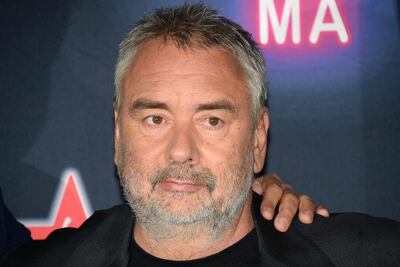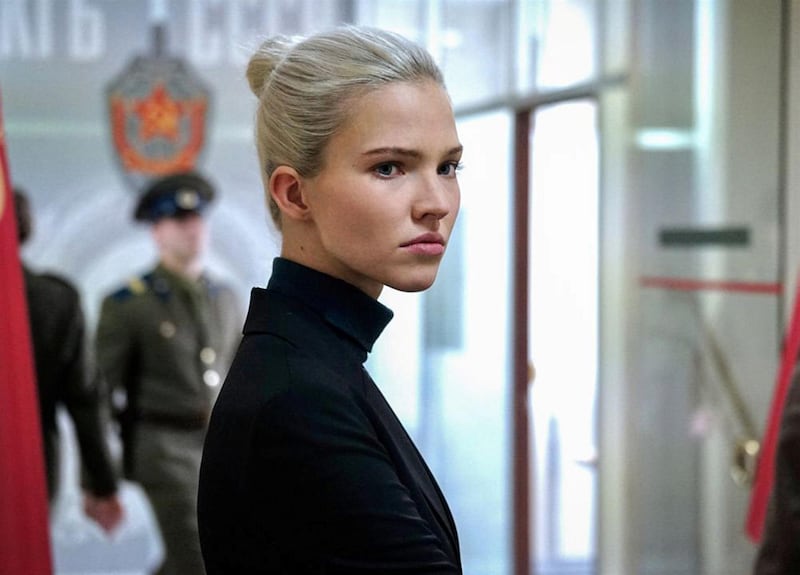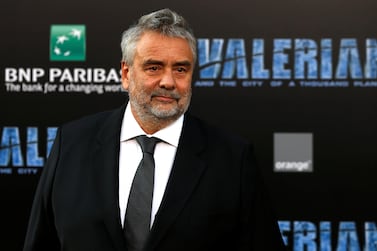Luc Besson's latest film, Anna, has finally been given a release date and will reach cinemas in the UAE on June 27, after a June 21 release in the US. The film was due to be released last year, but after the director was acused of rape, its distributors, Lionsgate, shelved the release pending investigations.
With the charges against Besson now dismissed, Lionsgate has pressed ahead with the release and judging by the trailer, the film looks like a typically stylish Besson action movie. It's not the first time the French director has taken on the "stylish, beautiful female assassin" concept – we're looking at you La Femme Nikita, Lucy and Leon: The Professional (sort of) – but in fairness he does it very well, and Anna looks like it will be no exception. The big question is: could this be Besson's last film?
Probably not, as that's something of an over-simplification. But it could be his last as the self-sustaining cinematic behemoth that is Luc Besson. Ever since 1985's breakthrough Subway, Besson's first film for French studio Gaumont, he has been a virtual guaranteed money-maker at the French and global box office. During his time at Gaumont, his biggest successes included films such as Leon, Nikita and, at the time France's biggest global box office success, 1997's The Fifth Element, which pulled in $264 million (Dh970m) globally.
After all this success, Besson and Gaumont deputy chief executive Pierre-Ange Le Pogam decided to strike out alone in 2000 and set up Europacorp, a new independent studio in northern Paris that would produce and distribute Besson's films, as well as work by other directors. It contains its own extensive in-house studio facilities and backlot, an in-house film school, and has further operations in Hollywood, Japan, China and Poland.
Europacorp has had some notable successes in the intervening years, including The Transporter franchise, which Besson wrote and produced, the Taxi franchise, also written and produced by Besson, and the Taken franchise, again a Besson production from his own script. Taken 2 shattered Besson's record for highest globally grossing French film with about $400m in box office receipts.
Other well-known names to direct films under the Europacorp banner, with Besson producing, include Tommy Lee Jones (The Homesman, The Three Burials of Melquiades Estrada), Guy Richie (Revolver), Lone Scherfig (Their Finest) and Gary Oldman (Nil by Mouth). To date, Besson's most successful output as a director with Europacorp is 2014's Lucy, with which he broke his box office record once again after enjoying a $463m haul.
In the first half of this decade it seemed Besson and Europacorp could do no wrong, and maybe that's why he decided to make 2017's Valerian: City of a Thousand Planets in the way he did. No one was surprised the director put the project into production – he was a well-known fan of the comics and had often discussed his desire to adapt them into a film. What fewer people expected was that Valerian would command the biggest budget of any indie film at about $200m.
The director said that what had kept him from making the film was not having a sufficient budget to do the project justice. He described his vision as "the film The Fifth Element could have been with a budget". The extensive marketing campaign, including the first use of a Beatles song, Because, in a non-Beatles film advertisement, which it's fair to assume didn't come cheap, could easily have cost another $200m. This was for a big screen adaptation of an obscure, surreal and markedly left-leaning French comic book from the 1960s, largely unknown elsewehere in the world.

On top of that, the film starred the relatively unknown Dane Dehaan in the role of Major Valerian alongside British model Cara Delavigne, whose acting portfolio consisted largely of British TV, the minor indie hit Paper Towns and a music video for South African rappers Die Antwoord. Valerian bombed.
Personally, I loved the film. It was surreal, insane, it made no sense, but it was utterly unique and a visual feast that didn't really need to fall back on logic or outdated notions such as "a script" or "convincing characters". Audiences disagreed, however. Its US opening weekend box office of $17m was lower than the already pessimistic $25m that had been predicted.
Last month, Europacorp was put into bankruptcy protection by the French government with about $270m in outstanding debt, the lion's share of which can be attributed directly to Valerian. The company has sold off the rights to a significant chunk of its back catalogue – more than 500 films, including 80 award winners – to Gaumont to help stay afloat. It has sold off its TV production unit, laid off employees and cut its annual production schedule from 10 films a year to five.
It has also said that in future it would stick to action films in the $25m-$35m budget field, where it has done so well historically. Ominously, since the company completed production of Anna, it has no films in production at all.
The company has held talks with several potential investors since Valerian took the wind from its sails. It has discussed deals with Netflix, Chinese investors and Tunisian movie mogul Tarak Ben Ammar, who brought the original Star Wars films to the Middle East.
The accusations against Besson haven't exactly endeared potential investors to the organisation and these talks appear to have failed to convince them to put their money into the film company. The latest reports from Paris suggest that major French distribution company Pathe may be interested in acquiring a majority stake in Europacorp now that Besson has been cleared of wrongdoing.
What the future holds for the company remains unclear. It's unlikely that the French government, with its laudable dedication to protecting the French film industry, would allow Europacorp to die, or would at least make efforts to safeguard its physical facilities – its impressive Parisienne studio set-up is one of the best in the country. Who will own these facilities in future and whether Europacorp will remain a production entity or simply a studio for hire is unknown. Besson's future role is also unclear.

It's unlikely that he will never make a film again, now that the allegations are behind him. His talent is undisputed and someone will always be on hand to put him behind a camera. Whether he will ever make a film again as the mastermind of his own indie production juggernaut, or be given access to the eyewatering amounts of money that were spent on Valerian, is another question, however.
Meanwhile, Anna looks like tremendous fun, so even if beautiful female assassin films aren't your thing, going to see it when it is released on June 27 would surely be the charitable thing to do?






